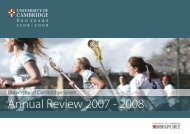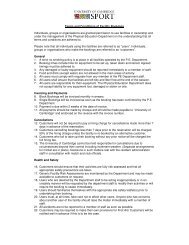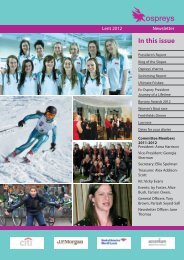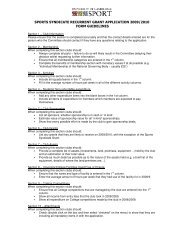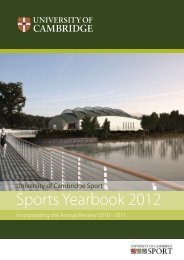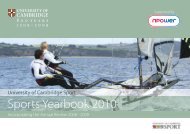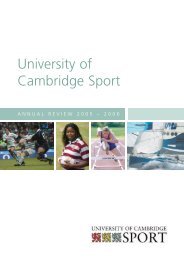Blues and the Blues Committee - Cambridge University Sport
Blues and the Blues Committee - Cambridge University Sport
Blues and the Blues Committee - Cambridge University Sport
Create successful ePaper yourself
Turn your PDF publications into a flip-book with our unique Google optimized e-Paper software.
<strong>Blues</strong> <strong>and</strong> <strong>the</strong> <strong>Blues</strong> <strong>Committee</strong><br />
Some historical notes<br />
Issue 1 of <strong>the</strong> Hawk gave a (fairly) accurate account of <strong>the</strong> current situation concerning <strong>the</strong><br />
awarding of <strong>Blues</strong> <strong>and</strong> Half-<strong>Blues</strong>. I have been asked, by <strong>the</strong> Editor, to produce something<br />
more, by way of a historical background.<br />
The question of <strong>the</strong> origin of <strong>the</strong> <strong>Cambridge</strong> Blue is often posed, but does not have a simple<br />
answer. <strong>Sport</strong> at Oxford <strong>and</strong> <strong>Cambridge</strong>, as we now know it, was very much a development<br />
derived from <strong>the</strong> English Public Schools in <strong>the</strong> second <strong>and</strong> third quarters of <strong>the</strong> nineteenth<br />
century. Even at <strong>University</strong>, school loyalties <strong>and</strong> influences remained strong (witness <strong>the</strong><br />
various Trinity boats for ex-members of different schools, <strong>and</strong> <strong>the</strong> several school-determined<br />
versions of football <strong>and</strong> fives), <strong>and</strong> school colours were sometimes still worn. <strong>Cambridge</strong><br />
Colleges soon developed <strong>the</strong>ir own sports clubs, of course, <strong>and</strong> <strong>the</strong>se again had <strong>the</strong>ir own<br />
colours <strong>and</strong> regalia.<br />
The first ever sporting match between Oxford <strong>and</strong> <strong>Cambridge</strong> was at cricket, held on 4 June<br />
1827. There is no record of any "colour" being worn on that occasion. In <strong>the</strong> first boat race,<br />
on 10 June 1829 at Henley, <strong>the</strong> <strong>Cambridge</strong> crew wore white, with a scarlet or pink (accounts<br />
vary) sash, honouring <strong>the</strong>ir Captain W. Snow from St. John's. The second, 1836, boat race is<br />
<strong>the</strong> event associated with <strong>the</strong> origin of <strong>the</strong> "blue" (mentioned also in Hawk 1). Just before <strong>the</strong><br />
race, it is said that R.N. Phipps, of Eton <strong>and</strong> Christs, thinking that <strong>the</strong> <strong>Cambridge</strong> boat should<br />
have a "colour" at its bows, called at a haberdashers <strong>and</strong> asked for a piece of ribbon or silk.<br />
The colour of <strong>the</strong> ribbon was light blue, perhaps because it was Eton's colour, or Gonville &<br />
Caius' colour (<strong>the</strong>re were three Caians in <strong>the</strong> boat) or simply because it was <strong>the</strong> colour of <strong>the</strong><br />
nearest bit of ribbon to h<strong>and</strong>! For whatever reason, this choice of light blue, made in 1836,<br />
stuck; <strong>and</strong> became <strong>the</strong> official colour of <strong>the</strong> <strong>Cambridge</strong> <strong>University</strong> Boat Club.<br />
Despite <strong>the</strong> early dates of <strong>the</strong>se initial contests, <strong>the</strong> Varsity cricket matches <strong>and</strong> <strong>the</strong> boat race<br />
did not become regular annual events until 1838 <strong>and</strong> 1856 respectively. As <strong>and</strong> when o<strong>the</strong>r<br />
<strong>University</strong> clubs established first <strong>the</strong>ir identities <strong>and</strong> <strong>the</strong>n matches against Oxford, <strong>the</strong>y were<br />
at liberty to choose any representative colour <strong>the</strong>y wished. But, thinking to continue in an<br />
established tradition, <strong>the</strong>y usually also picked light blue <strong>and</strong>, in courtesy, sought permission<br />
from <strong>the</strong> C.U.B.C. before awarding this "Blue". Thus arose <strong>the</strong> custom of consulting with<br />
C.U.B.C.; <strong>the</strong> President of C.U.B.C. becoming <strong>the</strong> arbiter of affairs for some 40 or more<br />
years.<br />
The senior clubs in <strong>the</strong> <strong>University</strong> in <strong>the</strong> 1860s were undoubtedly <strong>the</strong> Athletics, Boat <strong>and</strong><br />
Cricket clubs. This is well exemplified by <strong>the</strong>ir inclusion, alone, in Volume 1 of Desborough<br />
<strong>and</strong> Croome's classic "50 years of sport at Oxford, <strong>Cambridge</strong> <strong>and</strong> <strong>the</strong> Great Public Schools" -<br />
all o<strong>the</strong>r sports being relegated to Volume 2. These three all held Full Blue status, <strong>and</strong> <strong>the</strong><br />
President of C.U.B.C. often consulted with <strong>the</strong> C.U.A.C President <strong>and</strong> C.U.C.C. Captain, <strong>the</strong><br />
trio thus operating as an informal <strong>Committee</strong>, when contentious matters required decision. A<br />
number of smaller, or more specialised, sports clubs successfully petitioned for Half-Blue<br />
status, <strong>and</strong> <strong>the</strong> following had started Varsity matches by 1880: Rackets, Real Tennis,<br />
Billiards, Rifle Shooting, Steeplechasing, Bicycling, Golf, Polo <strong>and</strong> Cross Country running,<br />
although not all of <strong>the</strong>se reached half-Blue status. Chess held its first Varsity match in 1873<br />
<strong>and</strong>, to this day, jealously guards <strong>the</strong> half-Blue status awarded to it by C.U.B.C. (a letter on<br />
file with <strong>the</strong> <strong>Blues</strong> <strong>Committee</strong> reports that <strong>the</strong> early chess Varsity matches, held in London,
attracted crowds approaching a thous<strong>and</strong>, with an official needed to try to keep <strong>the</strong>m moving<br />
with shouts of "permeate yourselves gentlemen"!).<br />
It is not surprising that, with athletics <strong>and</strong> rowing dominating <strong>the</strong> <strong>University</strong> sporting scene in<br />
<strong>the</strong> Michaelmas <strong>and</strong> Lent terms (<strong>the</strong> traditional Boat Race <strong>and</strong> <strong>the</strong> Varsity sports, as <strong>the</strong><br />
Athletics Varsity matches were <strong>the</strong>n called, were held <strong>the</strong>n in March of each year), <strong>and</strong><br />
cricket <strong>the</strong> Easter term, <strong>the</strong>se senior sports were not enthusiastic when Rugby <strong>and</strong> Soccer,<br />
having only recently more or less disentangled <strong>the</strong>ir origins <strong>and</strong> rules, <strong>and</strong> established <strong>the</strong>ir<br />
own individual identities (ano<strong>the</strong>r interesting story), began to make great inroads into<br />
undergraduate sporting life in <strong>the</strong> 1870s. Their first Varsity matches were held in February<br />
1872 (Rugby) <strong>and</strong> March 1874 (Soccer) but, when <strong>the</strong>y sought Full <strong>Blues</strong> in 1883, Reginald<br />
Gridley, <strong>the</strong> C.U.B.C. President, toge<strong>the</strong>r with <strong>the</strong> Athletics <strong>and</strong> Cricket clubs, put many<br />
objections in <strong>the</strong>ir way. Despite evidence of great numerical support in <strong>the</strong> colleges,<br />
flourishing Varsity matches watched by many spectators, <strong>and</strong> <strong>the</strong> presence of Internationals in<br />
<strong>the</strong> <strong>Cambridge</strong> teams, <strong>the</strong> C.U.B.C. President <strong>and</strong> his cohorts remained unimpressed. The two<br />
Football clubs were eventually offered a limited number of full <strong>Blues</strong> to be shared between<br />
<strong>the</strong>m! This was not acceptable, <strong>and</strong> <strong>the</strong> Rugby players in <strong>the</strong> Varsity match in December<br />
1884 awarded <strong>the</strong>mselves <strong>Blues</strong>, <strong>the</strong> Soccer players doing likewise in <strong>the</strong> following term.<br />
The C.U.B.C. <strong>the</strong>n brought <strong>the</strong> dispute before <strong>the</strong> whole <strong>University</strong>, in a major debate at <strong>the</strong><br />
Union. This attracted a huge audience, <strong>and</strong> was won decisively by <strong>the</strong> football supporters,<br />
thus effectively forcing <strong>the</strong> C.U.B.C. to concede. Between that year, 1885, <strong>and</strong> 1912, several<br />
more sports began regular Varsity matches: Hockey (which received Full Blue status in<br />
1894); Lawn Tennis, Water Polo, Swimming, Boxing, Fencing <strong>and</strong> Sailing, all of which had<br />
Half-Blue status by 1912; <strong>and</strong> Ice Hockey, Lacrosse, Gymnastics <strong>and</strong> Pistol Shooting, which<br />
all had to wait longer for full recognition.<br />
During <strong>the</strong> first years of <strong>the</strong> 20th century, <strong>and</strong> no doubt mindful of <strong>the</strong> 1883-5 debacle, it<br />
seems to have been agreed that it was inappropriate for <strong>the</strong> Boat Club, almost singleh<strong>and</strong>edly,<br />
to determine <strong>the</strong> status of all o<strong>the</strong>r sports, <strong>and</strong> so it was that, on 1 March 1912, <strong>the</strong> <strong>Blues</strong><br />
<strong>Committee</strong> was established. Initially it consisted of <strong>the</strong> President <strong>and</strong> Secretary of C.U.B.C.,<br />
<strong>the</strong> President of C.U.A.C. <strong>and</strong> <strong>the</strong> Captains of C.U.C.C., C.U.R.U.F.C., C.U.A.F.C. <strong>and</strong><br />
C.U.H.C. Thus solely <strong>the</strong> Full Blue sports were represented on <strong>the</strong> <strong>Committee</strong> <strong>and</strong> C.U.B.C.<br />
"dominance" was maintained by its holding two seats. Moreover, <strong>the</strong> President of C.U.B.C.<br />
was ex-officio Chairman <strong>and</strong> had a casting vote. All those founding "st<strong>and</strong>ing rules" remain<br />
in force to this day, but <strong>the</strong> membership of <strong>the</strong> <strong>Committee</strong> has exp<strong>and</strong>ed to include <strong>the</strong><br />
Captains of all <strong>the</strong> o<strong>the</strong>r Full Blue sports - so Lawn Tennis (1922), Golf (1938), Boxing<br />
(1948), Squash (1960), Swimming (1966) <strong>and</strong> Cross Country (1977) are now represented.<br />
The <strong>Blues</strong> <strong>Committee</strong> has a "permanent" Secretary, who has always been a don; <strong>the</strong>re have<br />
been only six such Secretaries in <strong>the</strong> 84 years of <strong>the</strong> <strong>Committee</strong>'s existence, so <strong>the</strong> average<br />
"lifetime" in post is quite high. The <strong>Committee</strong> meets once each term, with strict quorum<br />
rules; but members of <strong>the</strong> <strong>Committee</strong> take <strong>the</strong>ir responsibilities seriously <strong>and</strong> turnout at<br />
meetings is invariably excellent.<br />
The <strong>Committee</strong> spends much of its time sitting in judgment on requests for Full or Half <strong>Blues</strong>.<br />
It initially determines an appropriate status for <strong>the</strong> sport, ranking it as Full Blue, Discretionary<br />
Full Blue, Half Blue or non Blue, according to its perceived popularity or importance. Once a<br />
sport is judged Full Blue, its Captain is given responsibility for making awards to his team, on<br />
behalf of <strong>the</strong> <strong>Blues</strong> <strong>Committee</strong>, <strong>and</strong> within any constraints or restrictions that <strong>the</strong> <strong>Committee</strong><br />
has laid down. In some Full Blue sports, all members of <strong>the</strong> team against Oxford receive Full<br />
<strong>Blues</strong> (Cricket, Golf, Hockey, Lawn Tennis, Rowing, Rugby Union, Soccer <strong>and</strong> Squash); in<br />
o<strong>the</strong>rs only some of <strong>the</strong> team receive Full <strong>Blues</strong>, <strong>the</strong> o<strong>the</strong>rs Half <strong>Blues</strong> (Athletics, Boxing,
Cross Country <strong>and</strong> Swimming); <strong>the</strong> Captain is trusted to make all <strong>the</strong> decisions. When a<br />
sport is judged to be of Discretionary Full Blue status, its Captain is empowered to make <strong>the</strong><br />
Half Blue awards to his team, <strong>and</strong> may request <strong>the</strong> <strong>Blues</strong> <strong>Committee</strong>, with some expectation<br />
of success, to grant one or more Full <strong>Blues</strong> to some of its members; thus <strong>the</strong> <strong>Committee</strong>,<br />
ra<strong>the</strong>r than <strong>the</strong> Captain, has <strong>the</strong> discretion that is in <strong>the</strong> title. The current Discretionary Full<br />
Blue sports are Badminton, Basketball, Canoeing, Cycling, Fencing, Judo, Karate, Modern<br />
Pentathlon, Orienteering, Rifle Shooting, Rugby League, Sailing, Skiing <strong>and</strong> Water Polo The<br />
Captain of a Half Blue sport is empowered only to grant Half <strong>Blues</strong>, on behalf of <strong>the</strong><br />
<strong>Committee</strong>. But a recent (1990) rule allows <strong>the</strong> <strong>Committee</strong>, on rare occasions, to grant an<br />
Extraordinary Full Blue in a sport that o<strong>the</strong>rwise only holds Half Blue status. Half Blue<br />
sports are Archery, Eton <strong>and</strong> Rugby Fives, Gymnastics, Ice Hockey, Korfball, Lacrosse,<br />
Lightweight Rowing, Pistol Shooting, Polo, Rackets, Real Tennis, Riding, Table Tennis,<br />
Volleyball <strong>and</strong> Weightlifting No Full or Half Blue can be awarded in a sport that holds non<br />
Blue status.<br />
The <strong>Committee</strong> is also empowered to make decisions on team sizes in squad sports, on<br />
eligibility for <strong>Blues</strong> of playing substitutes (an absolute rule is that no form of Blue can be<br />
awarded to anyone who did not actually play in a Varsity match - causing something of a<br />
problem in 1988, when not a ball was bowled in <strong>the</strong> Varsity Cricket match!) <strong>and</strong> all sorts of<br />
o<strong>the</strong>r issues concerning Varsity matches in all sports. In conjunction with <strong>the</strong>ir opposite<br />
number at Oxford, <strong>and</strong> with <strong>the</strong> two independent Womens' <strong>Blues</strong> <strong>Committee</strong>, a forum has<br />
been set up - <strong>the</strong> Joint <strong>Blues</strong> <strong>Committee</strong>, to debate <strong>and</strong> rule on matters of eligibility, <strong>and</strong> to<br />
discuss o<strong>the</strong>r matters of common concern. The <strong>Cambridge</strong> <strong>Blues</strong> <strong>Committee</strong> has a selfdenying<br />
ordinance (Rule X) stating "<strong>the</strong> <strong>Blues</strong> <strong>Committee</strong> have no jurisdiction in <strong>the</strong> affairs of<br />
<strong>the</strong> Women's Clubs" (1948) <strong>and</strong> "that <strong>the</strong> <strong>Blues</strong> <strong>Committee</strong> does not assume responsibility for<br />
awarding <strong>Blues</strong> to women" (1970). The <strong>Cambridge</strong> Womens' <strong>Blues</strong> <strong>Committee</strong> has full<br />
powers in <strong>the</strong>se matters, <strong>and</strong> liaison between <strong>the</strong> two <strong>Committee</strong>s is good; <strong>the</strong> President of <strong>the</strong><br />
Women's <strong>Committee</strong> having an observer's seat on <strong>the</strong> Men's <strong>Committee</strong>. In this regard, for<br />
example, protocol dem<strong>and</strong>s that <strong>the</strong> award of a Blue to a female cox of <strong>the</strong> men's Blue Boat is<br />
proposed by <strong>the</strong> Men's <strong>Committee</strong>, but ratified by <strong>the</strong> Women's.<br />
The <strong>Blues</strong> <strong>Committee</strong> is steeped in tradition, <strong>and</strong> somewhat conservative in its thinking, but<br />
by no means unwilling to move with <strong>the</strong> times. New sports regularly arise, petition for, <strong>and</strong><br />
receive status; but, to show evidence of permanence, <strong>the</strong>y must have held at least five<br />
successive Varsity matches. <strong>Sport</strong>s have recently lost status, <strong>and</strong> have been required to<br />
improve <strong>the</strong>ir organisation before retaining it. Decisions, perhaps arbitrary but not illogical,<br />
have been reached on <strong>the</strong> perpetual knotty question of "what is a sport " in reference to<br />
various activities, pastimes or pursuits which do not yet feature on <strong>the</strong> back pages of<br />
newspapers. In all <strong>the</strong>se matters, <strong>the</strong> <strong>Committee</strong> tries to act in a way that will not devalue <strong>the</strong><br />
"Blue", so that all those who have earned this distinction in <strong>the</strong> past can feel assured that <strong>the</strong><br />
present generation is doing its best to maintain st<strong>and</strong>ards.<br />
Christopher Thorne<br />
Secretary, <strong>Blues</strong> <strong>Committee</strong><br />
St. Catharine's College<br />
10 July 1996



